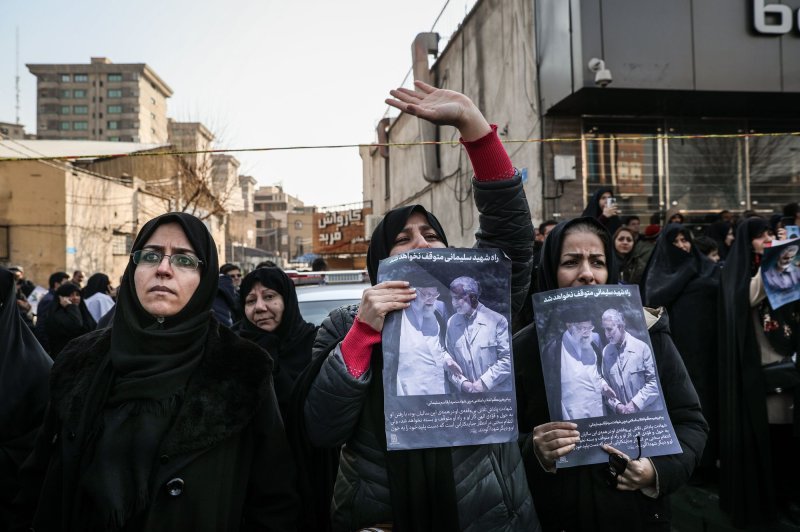Thousands of Iranian mourners gathered around the coffins of Iranian Revolutionary Guards Commander Qassem Soleimani to pay tribute during his funeral in Tehran on January 6. Photo by Majid Asgaripour/UPI |
License Photo
BUCHAREST, Romania, Jan. 15 (UPI) -- The confrontation between the United States and Iran and the controversy over the assassination of Qassem Soleimani are incontrovertible evidence that sound bites and slogans do not make good strategy.
Regarding the former standoff with Iran, why does the United States continue to use the 1979 "student" takeover of the American Embassy in Tehran in which 54 American citizens were held hostage for 444 day as rationale to consider Iran an enemy?
The United States reconciled with a Vietnam that killed 58,000 Americans during that war. And why does President Donald Trump wrongly continue to accuse the Obama administration of "giving" Iran many billions of dollars in exchange for signing the Joint Comprehensive Plan of Action?
The sound bite and slogan regarding Soleimani is that he was an evil man with the blood of hundreds of Americans on his hands. Hence, his killing was justified, regardless of the "imminence" of any attack. Joseph Stalin, who was vital ally in World War II; Mao Zedong, against whom we fought a war in Korea; and North Korean leader Kim Jong Un were far more brutal and evil. But we chose not to assassinate any of them. Richard Nixon, the great anti-communist, went to China and signed two arms-control deals with the evil empire, the USSR, and Trump has "fallen in love" with the last of that trio.
Further, who in the U.S. government had the authority to declare the Iranian Revolutionary Guard Corps, an arm of the Iranian government, a terrorist organization? We never declared the Communist Parties of Red China or the Soviet Union as terrorists, including the KGB and GRU, who actively killed enemies of the state in foreign countries. The answer is that the State Department made that claim when in fact the responsibility should be Congress'. And if killing Soleimani was justified, why then not go after Iran's supreme leader, who is responsible for the IRGC?
The point is that these sound bites and slogans are dangerously superficial substitutes for analysis and reason and, of course, for considering the consequences of any action. While bringing Soleimani to justice was welcomed, his death managed to unite a divided Iran and Iraq against the United States, nearly precipitated an escalation of violence and deferred a further crisis that almost certainly will reoccur.
That the United States recognized Vietnam and China and sees Iran as a grave threat because of its "malevolent" intentions in the region is baffling. The Obama administration at least tried to improve relations through the JCPOA. But its Defense Department with its "four plus one" strategy in which the United States must deter -- and if war comes defeat -- China, Russia, North Korea and Iran while still fighting violent extremism maintained Tehran as an enemy.
Before 1979, Iran under the shah was an ally, along with Saudi Arabia, in the Nixon "two pillar" policy designed to deter Soviet aggression against the vital Gulf oil supplies. Yes, Iran supports Hezbollah and is engaged throughout the region opposing Israel and the Saudis. But given the threat of radical Islam, Iran has common interests with us. Unfortunately, radicalism does not have the same gravitas as did the Soviet Union in binding Iran with the West and its neighbors against Moscow. So the sound bite of the world's greatest supporter of terror persists.
Last, Trump continues to lie or ignore the facts about Iran's oil revenues. About oil, the West froze some $50 billion in Iranian funds in offshore banks as part of sanctions. This was and is Iran's money. It was returned. The bulk of that money went to paying off past debts.
At the same time, Iran had sued and won in international courts for some $400 million it had prepaid for U.S. weapons systems prior to the Shah's overthrow in 1979 that had never been delivered. The court ordered the United States to return the money and to pay interest until it was repaid. In 2015, that interest and principal amounted to about $1.7 billion Washington legally owed. That payment took place after the signing of the JCPOA. And U.S. taxpayers were relieved of those odious but legal interest payments.
Little of this is in the public debate. Without full knowledge and understanding of these issues, sound bites and slogans will continue to dominate strategy. American should not wonder then why many of our policies this century have failed. And there is little prospect this will improve even if a different administration takes office.
Harlan Ullman is UPI's Arnaud de Borchgrave Distinguished columnist and a senior adviser at the Atlantic Council. He was a professor of military strategy at the National War College and the Naval War College. His latest book is "Anatomy of Failure: Why America Has Lost Every War It Starts." Follow him @harlankullman.















